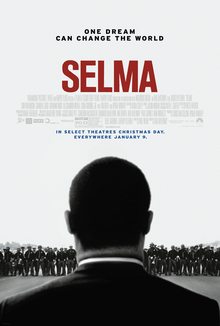Selma is based on the famous marches from Selma to Montgomery to protest against the lack of civil freedoms experienced
by black people during the 1960s. The film follows Martin Luther King (David Oyelowo)
as he leads a group of people willing to face extreme violence to achieve their
goals and the film also closely follows his battles with American President Lyndon Baines Johnson (Tom
Wilkinson) in a bid to push his demands into American law.
I've stood on the actual spot where
Martin Luther King proclaimed that he had dream that his 'four little children
will one day live in a nation where they will not be judged by the colour of
their skin, but by the content of their character' to over 250,000 people. Martin
Luther King was an outstanding orator with a powerful voice and an intelligent
use of language that helped make him and his speeches so captivating. What
David Oyelowo (who was born in the same hospital as I was - the John Radcliffe
Hospital in Oxford) does so well is capture the essence of King, he is utterly compelling
when he is on screen whether racked by his own self doubt or speaking to
hundreds, thousands maybe even hundreds of thousands of people.
It was quite a shock at the time
to see David Oywlowo's name left off the list of actors nominated to receive
the Best Actor gong for 2014 as was Ava DuVernay's for Best Director. Whilst
her exclusion was less of travesty, her name is deserving of recognition far
more than Bennett Miller (for Foxcatcher, which was rather slow and dull) and
Morten Tyldum (for The Imitation Game
which whilst being well made and good fun remains unremarkable).
Ava DuVernay does have a lot to
say about America in 1960s and in the present day. As far as I am concerned, America has come a
long way from the segregation of the early 60s but issues like Ferguson and
recent Church massacre (a scene in Selma bears some resemblance to this attack)
shows that America has a long way to go. The many scenes of police brutality
highlights the state police actions against black people in both 1963 and the
present day where the murder of unarmed black people is disproportionately high.
Perhaps, America hasn't come as far as it would like to think.
The central arc of the narrative
is gripping overall, but there are places where the narrative does slow down quite
a bit. The film not only looks at the charisma and bravery of MLK but also looks
at his own crippling self doubt, in fact the closer MLK got to his assassination
in Memphis, Tennessee the more disillusioned he became with America. The film doesn't ignore
his family life and the position they find themselves in and the pressures they
too are under, and it also doesn't ignore his transgressions as his affairs are, albeit briefly, mentioned.
David Oyelowo's performance is
the major factor that keeps the arc of the narrative so gripping, his
performance is undoubtedly the finest and most noteworthy but he is supported
by some impressive performances by his co-stars. Wilkinson's performance as LBJ (debate rages on
about the film's depiction of him) is superb and Tim Roth (playing a villain
even more odious than Sepp Blatter) is at his slimy best.
4/5




Agreed. Good review.
ReplyDeleteThanks.
DeleteThis was good, but it could have been great and it missed many marks. If only the whole film could have captured the same emotional and energetic jolt of the march scenes. Good review, though!
ReplyDeleteYeah...when King was public speaking and wasn't on a march the film did lack an element of dramatic tension,
DeleteIt was excellent, and Oyelowo was amazing. There were a few slow spots, but overall I loved it.
ReplyDeleteTotally agree.
Delete